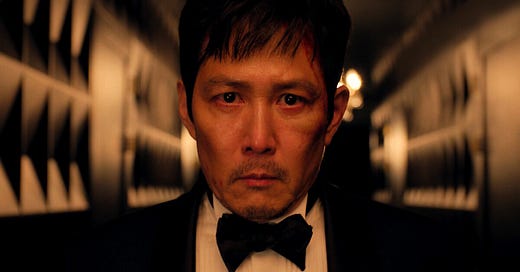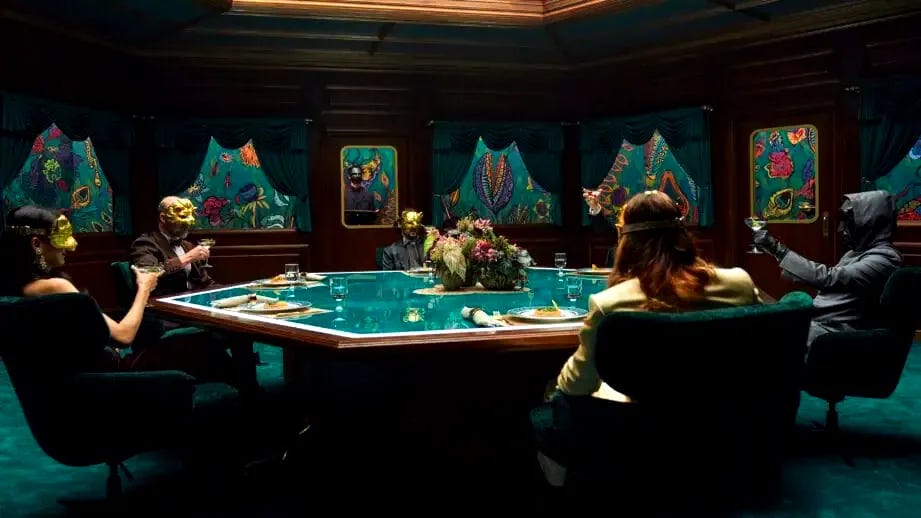Since its explosive debut in 2021, Squid Game has etched itself into the cultural memory like a scar; raw, aching, unforgettable. Its violence was visceral, its pace relentless, but what truly made it echo across the globe was not the bloodshed, but the brutal clarity with which it reflected our world. It seduced us with its aesthetics, gripped us with its stakes, and then tore us apart with its truths. Beneath the spectacle of the games lies a thesis far more terrifying than death itself: that humans, when reduced to desperation, will either destroy one another or die trying not to. That we are not all equal, even when stripped to our most basic form. That some will always have more than others, even when there is supposedly nothing left.
At surface level, the show is about money. It’s about a ruthless capitalist machine and the unfathomable chasm between rich and poor, powerful and powerless. As the series unfolds, especially in its emotionally explosive third season, it becomes clear that Squid Game is a far more intimate study of human nature. It's a show about people.
Season 3 pushes this interrogation to its limits. Gi-hun returns to the games for a second time, not for fortune, but for something deeper. Alongside this is the haunting arc of a child born amidst the carnage; a child who began its life in an environment that has only ever known death.
The child becomes a cipher for the audience, a vessel for interpretation. In her, we see a future that might be better, but might not. We see a world that might change, but probably won’t.
Gi-hun’s final line is the emotional crux of the entire show. Standing bloodied and broken, he says: “We are not horses. We are humans. Humans are…” and he stops. The sentence trails off.
As viewers, we wanted justice. We wanted vengeance. We wanted the elites punished, the games dismantled, the cycle ended. We wanted a neat ending, one where the villain falls and the hero walks into the light, but instead, we got reality. We got discomfort. We got a question. Maybe that’s the point, because Squid Game isn’t just entertainment, it’s a mirror we’re forced to stare into.
The Anthropology Of Endings: Why We Crave A Happy Conclusion
Across time, across continents, across languages, humans have told stories. The impulse to narrativise is hardwired into us. Anthropologically, this impulse reflects our need to make sense of a world that rarely cooperates. Claude Lévi-Strauss saw myth as a tool for resolving contradictions: how can we be mortal and dream of eternity? How can we be cruel and crave connection? Myth makes contradiction palatable. Story transforms chaos into structure. Pain becomes noble. Death becomes meaningful.
In modern media, we still chase this logic. We demand closure. Happy endings aren’t just comforting, they’re therapeutic. They remind us that suffering isn’t meaningless, that perseverance is rewarded, that villains can fall, and when a show denies us that comfort, we feel betrayed.
Squid Game knows this. It plays with it. It weaponises our longing for hope, and then it rips it from us.
The result? A deeper, more truthful mirror, because real life is often unresolved. Poverty cycles rarely break. The rich get richer. Injustices aren’t always corrected. The sick get sicker. Oppression doesn’t dissolve under a single act of bravery.
We crave a happy ending not just because we want to be entertained, but because we want to believe in the possibility of change.
The Infinite Puzzle Of The Human Condition
Anthropology has always strained to define the human essence. What separates us from animals? From Gods? Is it language? Emotion? The ability to dream? Or is it simply the act of asking these questions at all?
Marcel Mauss believed that every act, even generosity, is embedded with motive. Every gift is a transaction. Every kindness, a negotiation. Meanwhile, Victor Turner explored the beauty of liminality, the human potential revealed in in-between states. He understood that identity is rarely fixed; we transform constantly. We are not one thing. We are many.
Squid Game lives in that liminality. It presents humans not as good or bad, but as a series of choices made under pressure. When everything is stripped away, who do we become? When we have everything we ever wanted, who do we become?
Humans are fragile. Humans are strong. Humans are protective. Smart. Stoic. Brave. Bold. Kind. Cowardly. Determined. Devoted. Passionate. Naive. Reckless. Caring. Careless. Manipulative. Unkind. Shy. Considerate. Loyal. Cold. We are contradictions stitched together with longing.
The child in the show is proof of this. She is the embodiment of sacrifice. She is the legacy of hope. She is the burden of survival. She doesn’t know any of the people who died for her. She doesn’t know the world she’s been born into, but she exists, and her existence is the show’s final act of defiance: a child, in a place designed only for death.
Gi-hun's sentence is unfinished because the definition is still being written. Not just by him. By us.
Humans are... what?
Love is the thread that binds us through the violence, the grief, the silence between heartbeats. Love is what makes us linger in doorways, whisper apologies, remember birthdays, hold hands in hospital rooms. It is irrational, inconvenient, sometimes devastating, and yet, it remains the only constant force that defies logic and refuses to die.
In anthropology, we trace the evolution of tools, of rituals, of belief systems and economies, all changing with time, geography, and need. Among these shifting sands, one current flows unbroken: the instinct to love. Across every culture, every era, every origin story etched in bone and ash, humans have and always will seek connection.
We have buried our dead with care. We have wrapped our infants in blankets woven by our grandmothers. We have carved names into trees and sung to the stars and unseen Gods, hoping they’d protect the ones we hold dear. We have crossed deserts, oceans, battlefields, we have passed down lullabies. heirlooms, and family secrets. We have fought to death and sacrificed ourselves.
So, humans are…?
Humans are love.







Beautiful. I wish Squid Game 3 lived up your essay even a little bit.
I liked how you brought up the ending. My heart sank for a second when I saw those helicopters choppin away. But I suppose that's the neat ending in reality, not what we desire.